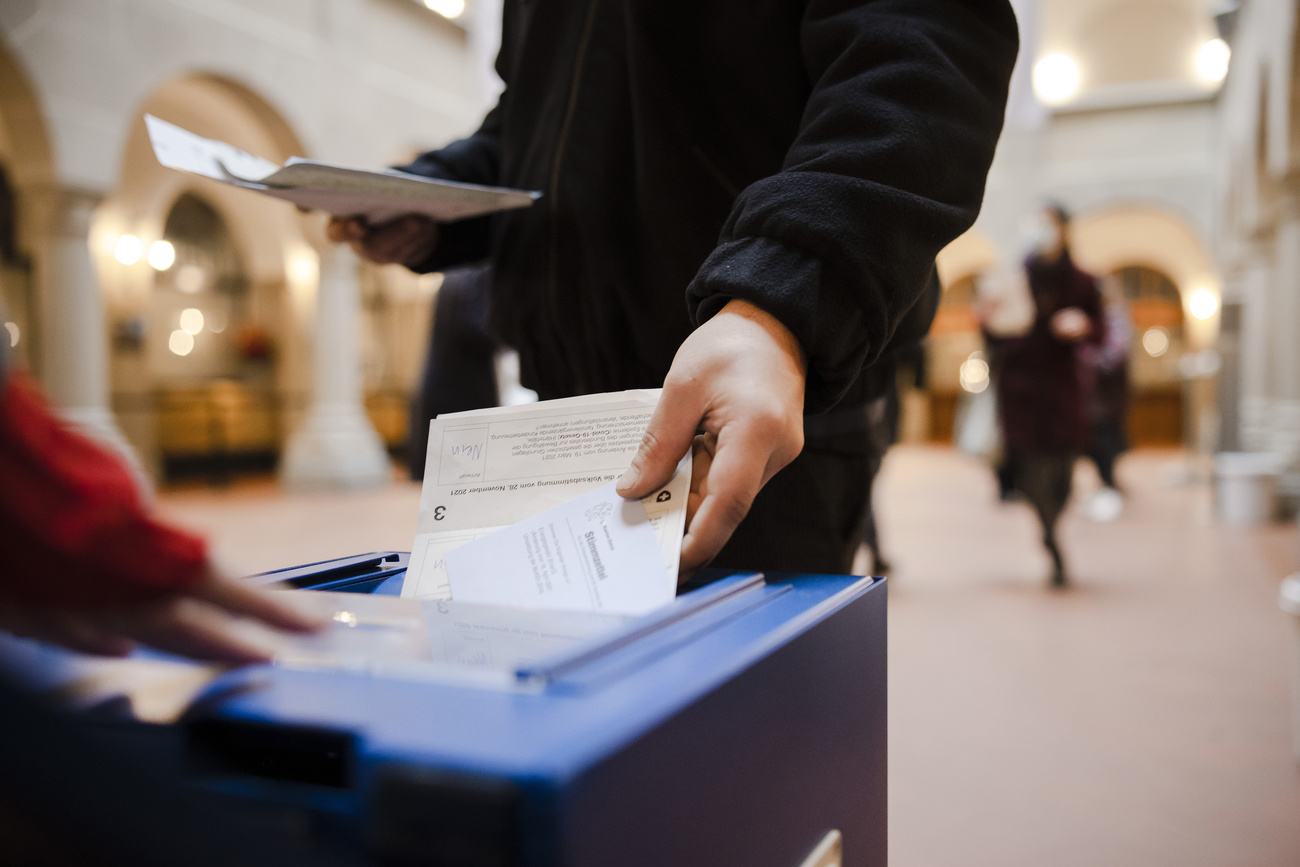
Swiss direct democracy

The Swiss political system is characterised by a very high level of citizen participation. More than half of all national votes ever held around the world have been in Switzerland.
The Swiss are more involved in political decision-making than any other people on earth. This active engagement is a key feature of Swiss direct democracy. They are generally called to the ballot box four times a year, to have their say on an average of 15 countrywide issues.
Between 1900 and 2020, Swiss citizens were thus eligible to take part in 621 popular votes at the national level, accounting for over half of such votes held worldwide. Similar ballots are also frequently organised at the cantonal and municipal levels.

More
How Swiss direct democracy works
Voting is not compulsory in Switzerland, apart from in canton Schaffhausen (although the fines for not doing so are very light). Turnout in nationwide votes has averaged 45% over the past ten years.
In reality, Switzerland has a combination of direct and representative democracy. Voters elect the members of parliament, who in turn appoint the government and enact laws. But the citizens also have several tools at their disposal for intervening in the law-making process.

More
Explainer: Is there no political opposition in Switzerland?
Mandatory referendum
The mandatory constitutional referendum has existed since the creation of the Swiss federal state in 1848. Certain laws approved by parliament are automatically put to a popular vote, namely:
- – Revisions of the constitution;
- – Accession to collective security organisations or supranational communities;
- – Emergency laws that have no constitutional basis and whose validity exceeds one year.
Before they can be adopted, such measures must receive a majority vote from both the people and the cantons.
Between 1848 and 2021, 240 laws were subject to a mandatory referendum, and 174 or them (72%) were adopted.

More
Freedom of expression at the ballot box: the Swiss case
Optional referendum
Since 1874, any citizen can launch a referendum against a law or decree that has been approved by parliament.
If at least 50,000 valid signatures are collected from citizens within 100 days of the official publication of the contested decision, a nationwide popular vote is held on the issue. A referendum may also be held if it is backed by eight cantons.
Since the introduction of optional referendums, around 6% of all parliamentary decisions have been put to a popular vote. Between 1874 and 2021, the people were called to vote on 200 issues being challenged by optional referendum, 116 of which (58%) were approved.

More
What’s a referendum?
The very existence of the optional referendum possibility also has an impact on parliamentary decisions: when drawing up a law, elected officials always strive to find the best possible compromise in order to avoid a popular vote.
A rejection by the people does not necessarily mean that a draft text is buried, but rather that parliament and the government may go back to the drawing board and come up with a more acceptable solution.
People’s initiative
The principle of the people’s initiative dates back to the founding of modern-day Switzerland and is one of the pillars of the country’s direct democracy. It enables the people to propose a total or partial reform of the constitution.
In order to be valid, an initiative must garner at least 100,000 signatures from citizens within 18 months. It then goes to a nationwide vote.
If an initiative about an overallrevision of the constitution is accepted by the people, the entire parliament and government are then renewed in extraordinary elections. The new authorities draw up a draft constitution and submit it again to a popular vote. The only such initiative that made collected enough signatures for a ballot was rejected by more than 70% of voters in 1935.

More
What’s a people’s or citizens’ initiative?
If a people’s (or citizens’) initiative concerns a partialreform of the constitution, parliament first examines its validity: the text must respect the principles of unity of form and substance as well as the fundamental principles of international law. The government or either of the two parliamentary chambers may propose a counter-proposal to the initiative, which can take two forms:
- – Direct counter-proposal: this is put forward in direct opposition to the initiative at the time of the popular vote, meaning that the citizens must say “yes” or “no” to both the initiative and the counter-proposal. They may accept both, and indicate in a subsidiary question which of the two they prefer in the event of a double “yes” vote.
- – Indirect counter-proposal: this is closely related to the initiative but does not oppose it. It is often a bill that partially addresses the concerns of the initiative committee. Parliament decides whether the counter-proposal will come into force only if the initiative is withdrawn or rejected by popular vote, or whether it will come into force even if the initiative is accepted.

More
How direct democracy has grown over the decades
If an initiative is formulated in general terms, parliament may approve it and draft a revision of the constitution, which it puts to popular vote, or else reject the initiative and submit it as it stands to the ballot box. Initiatives formulated in general terms are rare.
A people’s initiative may be withdrawn by the initiative committee up to the moment when the government sets the date for the popular vote. The vote must take place no more than ten months after the decision by parliament.
To be accepted, a people’s initiative must receive a majority vote from both the people and the cantons. If the “yes” vote wins, parliament must then draft an implementing law.
By the end of 2021, a total of 226 people’s initiatives had been submitted to the people. Only 24 of them (10%) were adopted. The initiative that garnered most support called for the introduction of a public holiday on August 1 to celebrate Swiss National Day. It was accepted by over 83% of voters in 1993.

More
The long road to women’s suffrage in Switzerland
Translated from French by Julia Bassam/urs, dos
To find out more about how Swiss democracy works, see:
Political rights – Federal ChancelleryExternal link
Citizens’ rights and the powers of parliamentExternal link
Results of nationwide votes (initiatives and referendums) – Federal Statistical OfficeExternal link

More
Foreigner voting rights

More
How to get Swiss citizenship?

In compliance with the JTI standards
More: SWI swissinfo.ch certified by the Journalism Trust Initiative


























You can find an overview of ongoing debates with our journalists here . Please join us!
If you want to start a conversation about a topic raised in this article or want to report factual errors, email us at english@swissinfo.ch.